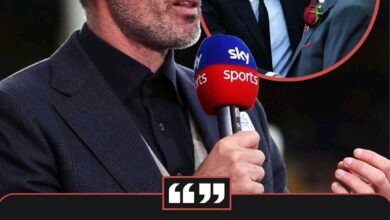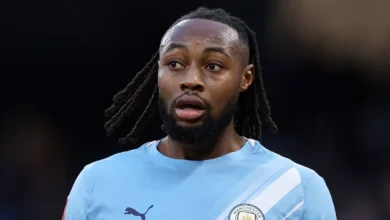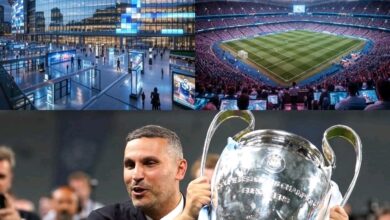Pep Guardiola hits out at Premier League over fixture schedule – as Man City face

Pep Guardiola expressed frustration at the Premier League for not rescheduling Manchester City’s final home game of the season against Bournemouth to support their Champions League ambitions. Speaking at his pre-FA Cup final press conference, Guardiola criticized the decision to keep City’s match on Tuesday rather than moving it to Wednesday, particularly after Tottenham’s game against Aston Villa was shifted to accommodate their Europa League final preparations.
City currently face a challenging schedule as they attempt to salvage their season, beginning with the FA Cup final against Crystal Palace at Wembley before focusing on securing a top-five finish in their remaining two league matches. Guardiola specifically noted that Bournemouth represents a particularly difficult opponent due to their physicality and intensity, while also highlighting that they’re competing for European qualification.
“It will be tough,” Guardiola stated. “We have been nine years fighting against these situations, every single season and nothing goes. We are going to play Tuesday night against the most intense, physical, direct and powerful team in the Premier League who are playing for European qualification. So we have to deal with that. Manchester United and Tottenham play on Friday and when it is possible, this is what we should do. I prefer to play on Wednesday.”
Though Guardiola acknowledged City hadn’t formally requested a schedule change, he implied that previous requests to adjust fixtures following Champions League knockout games and before FA Cup semi-finals had been unsuccessful. Wednesday’s slot is unavailable due to the Europa League final between Tottenham and Manchester United.
The upcoming Bournemouth match at the Etihad Stadium will serve as a farewell to Kevin De Bruyne, though Guardiola insisted sentiment wouldn’t influence his team selection for the FA Cup final against Palace. “I play with him because I believe he can produce what he has so far,” Guardiola explained. “Against Crystal Palace in the league, we were 0-2 down and he produced the free kick. We cannot do it because we are generous, we need him. We want to do it for him. He’s lifted 16 trophies in 10 years. Not bad I would say. One more would be good.”
Manchester City now find themselves in a position where they must balance competing in the FA Cup final while preparing for crucial league matches that will determine their Champions League qualification prospects. The fixture congestion represents another challenge in what has become an increasingly difficult season for the defending champions.
Guardiola’s comments reflect the ongoing tension between clubs competing across multiple competitions and the scheduling demands of domestic and European football. His pointed reference to Tottenham’s fixture adjustment suggests he believes City deserved similar consideration, particularly given their consistent participation in European competition over recent years.
The situation highlights the broader challenges of the football calendar, with elite clubs often facing compressed schedules that can impact performance and potentially increase injury risk. For City, the upcoming week represents a critical juncture in their season as they look to secure silverware in the FA Cup while also ensuring they maintain their place among Europe’s elite by finishing in the Champions League qualification positions.
Kevin De Bruyne’s impending departure adds emotional significance to the Bournemouth match, though Guardiola’s pragmatic approach emphasizes that team success remains the priority over sentimental gestures. The Belgian midfielder’s contributions to City’s success during his decade at the club have been substantial, with his potential to add a 17th trophy before leaving underlining his remarkable legacy.
City’s campaign now hinges on their ability to navigate this congested fixture period successfully, beginning with their performance against Crystal Palace in the FA Cup final. Guardiola’s public criticism of the scheduling decision indicates his concern about the physical demands being placed on his squad at this crucial stage of the season, particularly with a physically demanding opponent in Bournemouth scheduled just 72 hours after their Wembley appearance.
The Premier League’s approach to fixture scheduling has long been a point of contention for managers of clubs competing across multiple competitions. Guardiola’s comments suggest that despite City’s consistent participation in European competitions during his tenure, he believes they haven’t received adequate scheduling accommodations compared to other clubs.
As City prepare for their FA Cup final against Crystal Palace, the looming fixture against Bournemouth represents not just a farewell to De Bruyne but also a critical match in their pursuit of Champions League qualification. The congestion epitomizes the challenges faced by elite clubs in modern football, where success across multiple competitions often comes with the cost of demanding schedules.
Guardiola’s tenure at Manchester City has been characterized by consistent success both domestically and in Europe, but his comments highlight the ongoing challenges of balancing multiple competitions. The schedule they now face, with major matches in quick succession, will test the depth and resilience of his squad as they look to end what has been a more challenging season on a high note.
The match against Bournemouth takes on additional significance as De Bruyne’s final home appearance for the club. His contribution to City’s success during Guardiola’s era has been immense, with his creativity and vision proving crucial to their numerous trophy wins. While sentiment won’t dictate team selection according to Guardiola, there’s no doubt the occasion will carry emotional weight for both players and supporters.
City’s push for a top-five finish reflects the more difficult campaign they’ve experienced compared to previous seasons where they were often challenging for the title until the final weeks. The adjustment of expectations to now focus on Champions League qualification represents a significant shift for a club that has dominated English football in recent years.
Guardiola’s comments on fixture scheduling form part of a broader narrative about the demands placed on top-level players and teams in modern football. With domestic leagues, cup competitions, and European tournaments all requiring attention, the balancing act becomes increasingly difficult as seasons progress, particularly for teams competing on multiple fronts.
The FA Cup final represents an opportunity for City to salvage silverware from a season that hasn’t met their usual standards. Success at Wembley would provide a positive foundation heading into their final league matches, where securing Champions League football for next season remains the priority.
De Bruyne’s departure marks the beginning of what could be a period of transition for City. Having been a central figure in their success under Guardiola, his exit will require adaptation from both tactical and leadership perspectives. His final home appearance against Bournemouth offers fans the chance to acknowledge his contribution to what has been the most successful period in the club’s history.
Guardiola’s frustration with the Premier League’s scheduling decision reflects his perfectionist approach to management, where every detail that might impact performance is considered important. His comment about “nine years fighting against these situations” suggests he views this as part of a pattern rather than an isolated incident.
City’s current position illustrates how quickly fortunes can change in football, with a club that has dominated English football now facing a battle to secure Champions League qualification. The compressed nature of their remaining fixtures adds another layer of complexity to this challenge, with physical recovery between matches becoming increasingly important.
The situation also highlights the continuing influence of television broadcasters on fixture scheduling, with commercial considerations often taking precedence over sporting ones. Guardiola’s pointed comments suggest he believes City haven’t received equitable treatment in this regard compared to other clubs.
As City approach the final stages of their season, the pressure to perform becomes increasingly intense. The FA Cup final offers the opportunity for silverware, but the subsequent league matches will determine whether they maintain their place among Europe’s elite clubs next season. Guardiola’s comments indicate his awareness of the challenges ahead and his frustration at what he perceives as unnecessary complications added by the fixture schedule.
The farewell to De Bruyne adds emotional resonance to City’s final home game, though Guardiola’s pragmatic approach emphasizes that team success remains the priority. His comments about needing De Bruyne for his quality rather than sentiment reflect the professional demands of elite sport, where results ultimately take precedence over emotions.
City’s campaign now enters its decisive phase, with their performance over the next week likely to define how this season is remembered. The FA Cup final offers the chance of silverware, while the league matches will determine their European status for next season. Guardiola’s criticism of the fixture schedule represents his attempt to remove what he perceives as an unnecessary obstacle to success.
The scheduling dispute highlights the complex ecosystem of modern football, where various stakeholders including clubs, leagues, broadcasters, and governing bodies all have interests that don’t always align. Guardiola’s comments suggest he believes the sporting integrity of competition sometimes suffers as a result of these competing interests.
As City prepare for their final matches of the season, the pressure to perform is intensified by the compressed schedule. Their ability to recover physically and mentally between these high-stakes games will be crucial to their success, making Guardiola’s concerns about fixture scheduling particularly relevant.
The farewell to De Bruyne represents not just the departure of a key player but potentially the beginning of a new era for City. His contribution to their success under Guardiola has been immense, making his final home appearance a significant moment for both the player and the club.
Guardiola’s comments about fixture scheduling reflect his detailed approach to management, where every factor that might impact performance is considered important. His frustration suggests he believes unnecessary obstacles have been placed in City’s path at a crucial stage of the season.
The situation exemplifies the challenges of modern football, where success brings with it increased demands in terms of fixtures and expectations. City’s current position, fighting for Champions League qualification rather than the title, illustrates how competitive the Premier League has become and how quickly fortunes can change.
As the season reaches its conclusion, City’s performance over the next week will determine whether they can salvage success from what has been a more challenging campaign. The FA Cup final offers the opportunity for silverware, while the league matches will decide their European status for next season. Guardiola’s criticism of the fixture schedule represents his attempt to create the best possible conditions for success during this crucial period.















